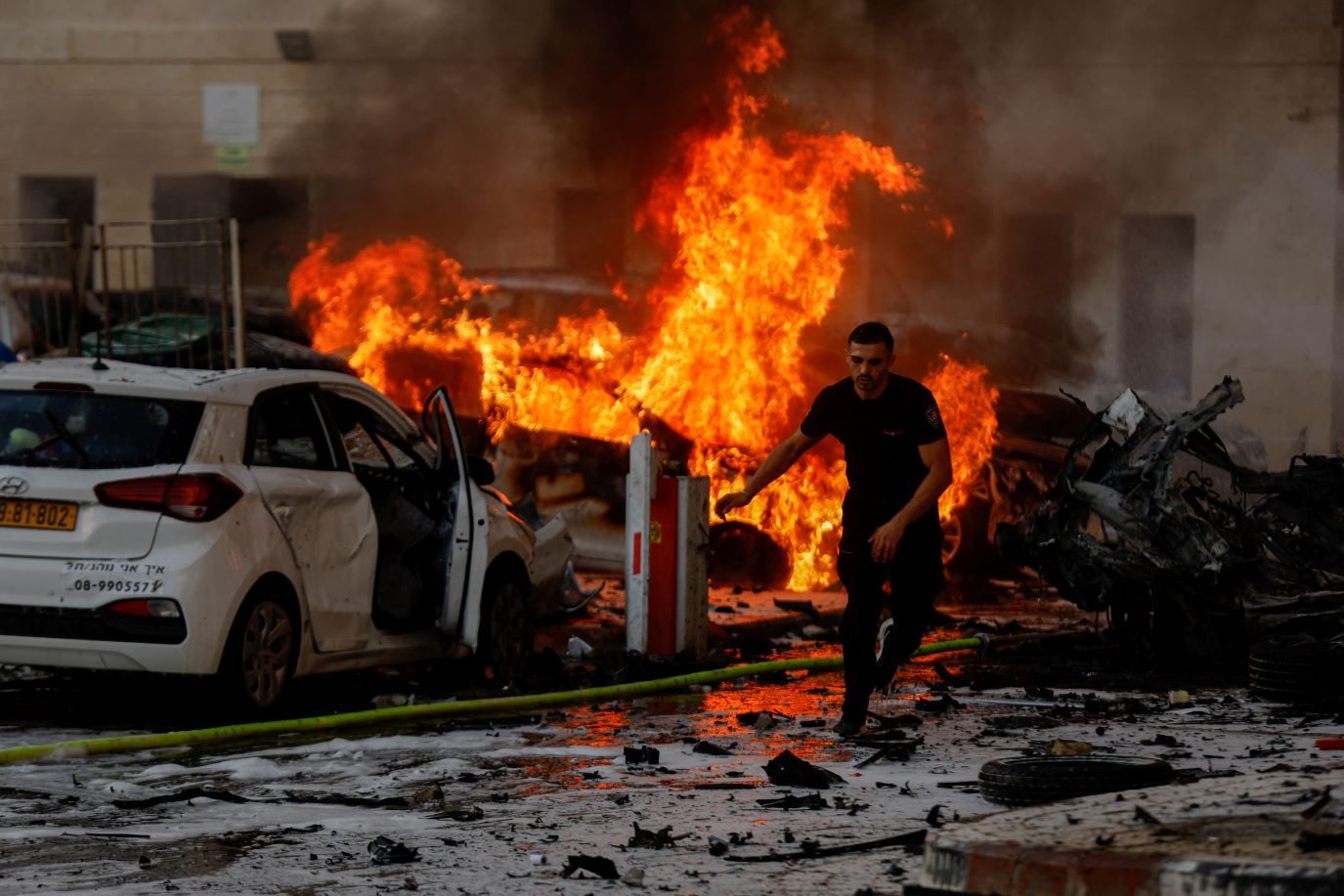Council of Councils (CoC) experts from Saudi Arabia, Germany, China, and Italy react to the surprise assault by Gaza militants on Israel on October 7, detail the regional and international implications, and propose ways forward for managing or ending the conflict in this Global Perspectives Roundup.

The Palestinian Issue Cannot Be Sidelined Any Longer
The attacks by Hamas and the reaction of Israel underscore the continued centrality of the Palestinian issue for overall Middle East security. This is despite the many international attempts to sideline the issue and not give the peace process the necessary and required attention. By paying lip service to the two-state solution for the past couple of decades, the rest of the world bears a share of responsibility for turning a blind eye to the pressure cooker of continued Israeli occupation of Palestinian land. The costs and consequences of this inaction are now clear for everyone to see.
Hamas has scored a victory by exposing Israel’s vulnerability, presenting a risk of increased violence and further instability on both sides. Hamas has effectively sidelined the Palestine Liberation Organization and its questioning of Israel’s legitimacy offers no alternative way forward. Similarly, Israeli Prime Minister Benjamin Netanyahu’s current government is the most right-wing and extreme in its history. It shows an absolute disregard for legitimate Palestinian rights and an unwillingness to compromise for the sake of a fair and peaceful resolution.
All of the above threatens the recent climate of de-escalation visible in the Middle East, from the signing of the Abraham Accords to the rapprochement between Saudi Arabia and other Gulf Cooperation Council (GCC) states with Iran, as well as the political progress to the conflicts in Syria and Yemen. While Saudi Arabia has been engaged in wide-ranging discussions on the possibility of normalization with Israel, the actualization of those talks is now highly unlikely in the foreseeable future.
Continued escalation and tit-for-tat retaliation will benefit no one. Heightened instability threatens not only the wider Middle East but has implications for the world as well. What is needed now is a multifaceted, two-pronged approach.
First, national governments and international institutions should make concerted efforts and use all of their channels of communication to ensure that the situation does not escalate further or involve other parties. A wider Middle East conflagration must be avoided. In addition, all mediation capabilities should be activated to defuse the situation, secure the release of hostages, and prevent a complete siege of the Gaza Strip. On this front, the GCC states are ready to play their part.
Second, the groundwork should be laid for genuine negotiations on the Palestinian issue. This means a combination of effective international endeavors to bring all parties to the table alongside widespread support for regional efforts and initiatives to end the lasting cycle of violence. Here, the Arab Peace Initiative needs to finally be given the proper consideration as a starting point for paving a path forward. Comprehensive peace cannot be imposed but must ultimately come from within. The Arab Peace Initiative is an essential component in this regard and underscores the commitment of Saudi Arabia to the two-state solution as a moderate and rational approach to the crisis.
Preventing Regional Spillovers and Living Up to Humanitarian Responsibilities
The Hamas-led surprise attack on Israel on October 7 by land, air, and sea has been a traumatic rupture for Israel. The infiltration of hundreds of fighters into cities, communal settlements known as kibbutzim, and military sites, the destruction and conquest of military equipment, the gruesome mass murder of Israeli civilians, and the hostage-taking of up to one hundred fifty Israeli civilians and soldiers has shattered Israel’s image of military superiority and invulnerability. Operation Al-Aqsa Flood has been widely celebrated on social media and in the streets, well beyond the Arab world.
The United States and most European capitals have positioned themselves unequivocally on Israel’s side, echoing the need for retaliation and military victory. While this is understood against the backdrop of the abominable acts of terrorism and war crimes committed by Hamas and the Palestinian Islamic Jihad, third parties should now first and foremost work to prevent further regional conflagration.
They should also take seriously their humanitarian responsibilities by insisting that all actors respect international humanitarian law. In that endeavor, third parties like the United States should focus on negotiating humanitarian corridors that allow Gazan civilians to flee the violence, securing humanitarian access to allow for delivery of drinking water, food, medical supplies, and fuel, and exploring who can play which role in the effort to get hostages released.
In reaction to Hamas’s attacks, the European Union and several EU member states announced a review of their aid to the Palestinians. When doing so, they should take into account that Gazans not only strongly depend on humanitarian aid but also that development cooperation in, for example, the water and wastewater sector is critical to providing livelihoods. In addition, they should be aware of unintended consequences of aid cuts that would further undermine those forces who are counterweights to Hamas and Islamic Jihad, such as the Palestinian Authority and a vibrant Palestinian civil society.
Last but not least, the simple lesson learned from many conflict arenas—that the defeat of terrorism cannot be achieved by military means alone—should not be forgotten. American, European, and Arab governments should start immediately thinking about what a durable postwar stabilization could look like that offers an alternative for Gazans in particular and the Palestine question in general.
Major International and Regional Actors Should Push for De-escalation
The new round of Israeli-Palestinian conflict will be consequential in many ways.
First, the escalating tensions will add new uncertainty to the regional détente experienced over the past couple of years, peaking in 2023, particularly with the Abraham Accords. The uncertainty will challenge regional security.
Second, the Palestinian issue will rise in importance in, and may move to the core of, regional agendas. Other issues will be de-prioritized at least for some time.
Third, the conflict could trigger Israeli reflections on its long-held approach of maintaining security by building military advantages while abandoning a political solution to the source of problems. The Israeli-Palestinian relationship in the longer term could change for the better if any reconsiderations really take place.
I foresee two scenarios going forward. First, a gradual de-escalation resulting from rational calculations of the conflicting parties and sufficient external pressure. The obvious distance between the two in military capabilities means that the military dimension of the conflict will end soon with Israel occupying significant parts of Palestinian territories; negotiations on the exchange of hostages and prisoners and other crucial issues will last longer.
Second, the crisis could escalate and spill over into the region more generally. If parties do not refrain from exchanging retaliations, if other regional state actors are involved, and if external actors do not push for de-escalation or peace, the conflict will become more serious.
Major international and regional actors should make efforts toward the first scenario due to real concerns for human rights and for peace in real terms. Major global actors could work together to pressure relevant parties to refrain from taking actions to escalate tensions. Putting out, instead of oiling, the fire should be the priority. The United States in particular could pressure Israel to be rational, while regional actors could restrict the behavior of subregional actors. China could also play a bigger role in mediating among various parties.
Unfortunately, the conflict is evolving toward the second scenario as several major external actors are politicizing the tragedy for their own geopolitical interests instead of pushing for peace. There is no concrete evidence linking Iran to Hamas’s Al Aqsa Flood operation, even though Iran politically does support Hamas. Such an intentional linkage will add unnecessary volatility to the conflict.
Israeli Arms Will Not Generate Security and Peace
Since Hamas launched the Al Aqsa Flood operation against Israel on Saturday, violence has reached alarming new peaks. The attacks have killed at least 1,300 Israelis, while Israel’s retaliatory strikes have killed more than 1,400 Palestinians. As a substantial military presence currently gathers near the Gaza Strip, Israel seems determined to escalate the conflict through ground operations.
The prospect of direct confrontations with Lebanese armed group Hezbollah along Israel’s northern border also cannot be dismissed. Meanwhile, incidents of violence against Palestinians in the West Bank have grown more frequent since Saturday’s events. The situation could deteriorate further as the Israeli government is planning to equip civilian units with thousands of assault rifles.
Foreign actors such as the United States, European Union, and Egypt, which had previously engaged in negotiations between Israelis and Palestinians, and Saudi Arabia, which was recently discussing normalization and détente with Israel, are now forced to confront what has hitherto been overlooked when working for peace in the Middle East: the colonial subjugation of Palestinians and continued occupation of their territories. This context is a persistent driver of radicalization within Palestinian militant groups such as Hamas. These factors underlie the absence of circumstances conducive to justice and security for Israelis and Palestinians.
Any international endeavour that disregards this factual reality is ultimately an exercise in futility. This holds true for the Oslo Accords, which rested on the power imbalance between Israelis and Palestinians, as well as the U.S. and EU peace initiatives (e.g., the Middle East Peace Process and Peace Day Effort, respectively). In this regard, the swift reactions from European countries and institutions, which have fueled the flames of punitive violence against Palestinians in Gaza and initially threatened the suspension of aid, raise pressing questions about the inadequacies and biases inherent in the prevailing framing and resulting policies.
It is myopic for foreign actors to believe that an eventual erasure of Hamas from Gaza, currently supported by the United States and European countries advocating for Israel’s right to defend itself, could prevent future escalation of Palestinian violence against Israel.
In the wake of recent violence, shifting away from the long-held policy of nonengagement with Hamas seems politically unfeasible for the United States and European Union. Yet the complex interplay between oppressive Israeli policies against Palestinians and the surge of military actions of Palestinian militants is undeniably evident. Saturday’s events are the most dramatic proof that security—and eventually peace—will not be delivered by Israeli arms, but only by sound diplomacy, and political courage linking Israel’s security to the end of the decades-old occupation and violation of basic human rights of millions of Palestinians.
In the short term, the path to achieving this is not an easy task for those foreign actors that have an interest in a stable Middle East, but it may well start with the abandonment of moral relativism, the upholding of humanitarian and development aid, and the call for the protection of civilians and of international law in Israel and Palestine.










